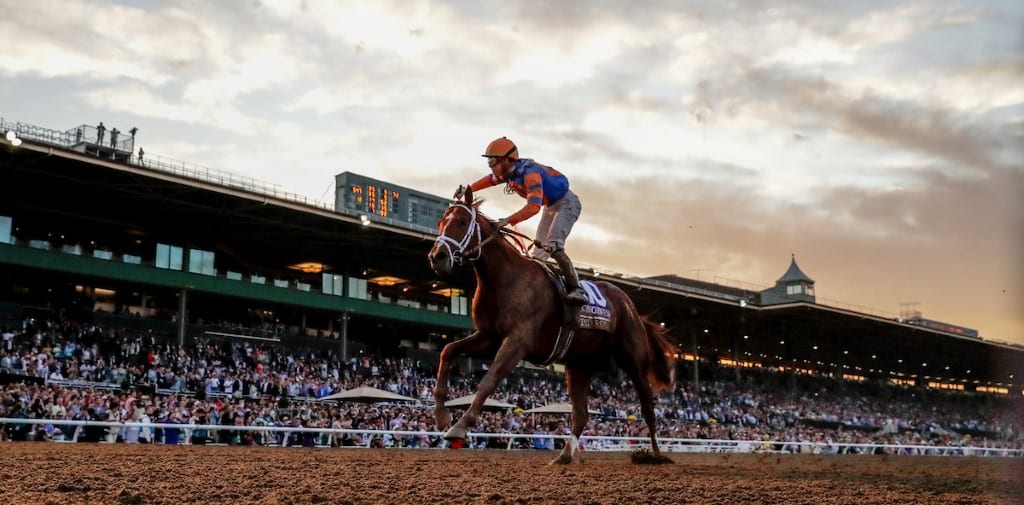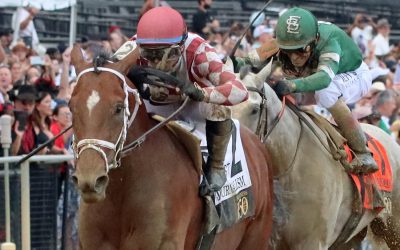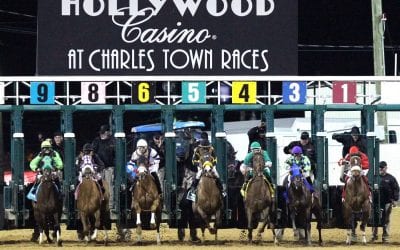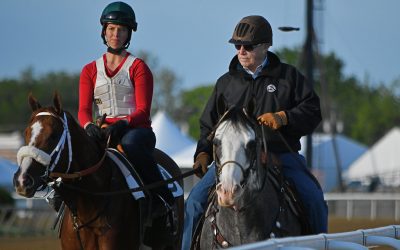Genaro: Breeders’ Cup shows sport I love – and hate

Vino Rosso was all by his lonesome in the final strides of the $6 million Breeders’ Cup Classic. Photo Alex Evers/Eclipse Sportswire/Breeders’ Cup/CSM
I didn’t start watching the Breeders’ Cup Classic until the horses were at about the quarter pole.
The race was on my television; I’d been tuned into the broadcast since it began at 3:30pm, but as has been my rather unconscious practice since 2012, I was listening to the races more than I was watching them.
One more way a love-hate relationship can manifest itself.
The winter of 2012 was that dreadful winter at Aqueduct, the one in which so many horses died, the one that launched a New York Times investigation, the one that led to a state task force and a 209-page report that included 10 pages of recommendations for improving the health and safety of New York’s horses.
That winter induced a sort of PTSD that made me keep my head down until I felt confident that the horses were all going to come home safely. Seven years later, I sometimes watch full races, but on Saturday, with so much at stake, that old feeling returned, so first I listened, then I watched.
With a name like mine, how could I not love a horse named Vino Rosso, owned by men named Repole and Viola? The stunning chestnut by Curlin was my pick that year, and putting aside any semblance of objectivity, I had rooted for him within the bounds of professionalism since he had won the Wood Memorial earlier that year.
His disqualification in the Jockey Club Gold Cup in September was wrenching, the kind of loss that makes you think that maybe that was his shot to win a Really Big Race, and now it was gone. Those chances don’t come along very often.
Fortunately, Team Vino didn’t see it that way, and so during the Breeders’ Cup Classic, when I heard Larry Collmus’ call, I glanced over to see that big red machine flying down the stretch. I jumped off the couch. I yelled. I pumped my fists. I threw my body into pulling him closer to, and then past, McKinzie, with so much noise and movement that my cats scrambled for cover.
I only had eyes for Vino, and I sank back onto my couch, grabbed my laptop, and went to Twitter, as one does (or at least I do), for the post-race reaction.
And then I saw this:
Almost. Damn.
— Jay Privman (@DRFPrivman) November 3, 2019
There was only one thing that Privman could be talking about.
I had missed it on the broadcast, missed Mongolian Groom being pulled up, but it was impossible to miss the social media reaction, complete with blame, diagnostic opinions, and apocalyptic predictions.
We had hoped and wished that we’d get out of the Breeders’ Cup without a tragic headline, and we knew that if we didn’t, a horse fatality would get more attention than any equine accomplishment.
The people who love horse racing and who make their living in it are rightly uneasy. The future of the industry seems to be in the hands of people who don’t spend a lot of time at the racetrack, and the fact that that is really the industry’s own fault is a bitter irony and of no comfort to those who fear that the death of Mongolian Groom is a harbinger of the death of the industry.
Zero deaths is an impossible standard. An incident-free Breeders’ Cup would not have stopped the reporting or the PETA and United States Humane Society press releases; they would resume the next time a horse dies at Santa Anita, or Belmont Park, or Churchill Downs.
On Saturday night, Jessica Chapel raised the issue of the ethics of horse racing, suggesting that those of who participate in it implicitly endorse it as ethical.
Maybe so.
Or…we could—or, I should say, I could acknowledge…hypocrisy? denial? wishful thinking?—that allows me to wrestle with my concerns about horses’ welfare, especially as that welfare is in the hands of an industry that so often proves itself to be haplessly, carelessly arrogant and unaccountable, preferring, time after time, to close ranks, to stifle criticism, and to keep quiet and hope that nobody notices what’s really going on.
I use only cruelty-free, and vegan where possible, personal and home care products, but I sometimes eat meat. I abhor the way chickens and pigs are raised in factory farms and think such practices should be outlawed, and I also recently relished a prosciutto sandwich. I tried wearing vegan boots for two years, and after two pairs sprung holes in less than a season, I don’t automatically reject leather any longer. We all makes these big and small compromises.
When I am on the backstretch in the morning, when I talk to trainers and see for myself the care that so many horses get, when I attach myself to a horse that helped get me through one of the hardest periods of my life, when I watched Vino Rosso, gleaming in the Santa Anita gloaming, triumphantly find redemption at the finish line of the biggest race of his life, I push aside, at least for a little while, my awareness of the risks inherent in the sport that I love. But the next time the starting gate opens, that awareness comes rushing right back, and I wonder how long I’ll be able to live with that.
LATEST BUSINESS NEWS
Preakness winner Journalism heads Haskell nominations
Journalism, winner of the Preakness and runner-up in the other legs of the Triple Crown, is among 18 runners nominated to the July 19 Haskell.
June wagering handle off 7 percent
Wagering on US races was off significantly in June versus the prior year and is down nearly three percent for the year to date.
Fasig-Tipton alters 2-year-old sale protocol
Under changes announced Tuesday, breezes at Fasig-Tipton Midlantic’s 2-yearr-old sale will be untimed and riders’ use of the crop restricted.
Charles Town to increase purses, add three days
With a favorable new law recently passed, Charles Town will increase purses by 10% in the new condition book and add three days of racing.
Supreme Court sends HISA cases back to lower courts
https://youtube.com/playlist?list=PLjs0BW-q6FzEBgJDXvjYpER9CwxGYbTMV&si=KwFM38OdUm_YI1U7 The U.S. Supreme Court has ordered lower courts to revisit legal challenges to the Horseracing...
D. Wayne Lukas, 89, passes
Hall of Fame trainer D. Wayne Lukas, 89, who announced the end of his training career just a week ago, has passed away, his family said.















Teresa, I think we can all relate to this piece, even those of us who’ve already come full-circle, and are now actively working to ban horse racing in its entirety. Thank you for writing it.
Having said that, I’m finding that voices like yours are drowning in the irate defensiveness of most others involved in this industry. Racing folks are having a more difficult time defending the indefensible; they will, and already do, blame those looking to legislate away their multiple cruelties as somehow responsible for those cruelties.
Further, the frequency of breakdowns are only the launchpad on which the anti-racing movement has gained recent momentum.
As a long-time thoroughbred owner and lifelong horse lover, I’m well aware of the obscenely-short “career paths” inflicted on the vast majority of racehorses. The general public is becoming aware of this, as well. Yet the overt hostility persists. Again, in our direction.
In the very near future, I expect that sensible voices such as yours will no longer have the luxury of that love/hate relationship with horse racing that you’ve described so well. We’ve evolved beyond it as a culture, and that’s not at all a terrible thing.
Stop racing horse. No more tragic headlines.
I understand. I walk that uneasy line of leather boots, cruelty-free products: support animal rescues, still watch horse racing. I find it harder and harder to keep watching. I think of the economic hardships that will follow in Kentucky, where they still believe those coal mining jobs will return. There are about 20,000 weanlings on the ground this year. What will happen to them? Horse racing can be made much safer and the animals can be much better protected. I see no legislative or industry will to do that, just a lot of yelling and resistance to incremental improvement. Install the best synthetic surfaces. They have gotten better. Every bettor, every owner, every rider, everyone who walks into a race course, or casino, a tax for equine welfare on every transaction. Wean this drug-crazed business off medication. Keep up the race day vet exams, jockey scratches, keep better records on injuries and death. We can try. Beats watching the mass slaughter of pregnant mares and young horses that no longer have any economic value because well-meaning souls ended the only job they were bred to do.
Classic. Blame the “well-meaning souls” who actually work to end the incessant slaughter machine and save the lives of dumped OTTBs for the ongoing and impending mass-slaughter that racing created.
And, by all means, keep trying, if you must. Didn’t work out so well for the greyhound racing industry, though. And they didn’t even have these sickening, stomach-churning, public-horror show breakdowns. Appreciate your civility, though; it’s become increasingly rare among your cohorts.